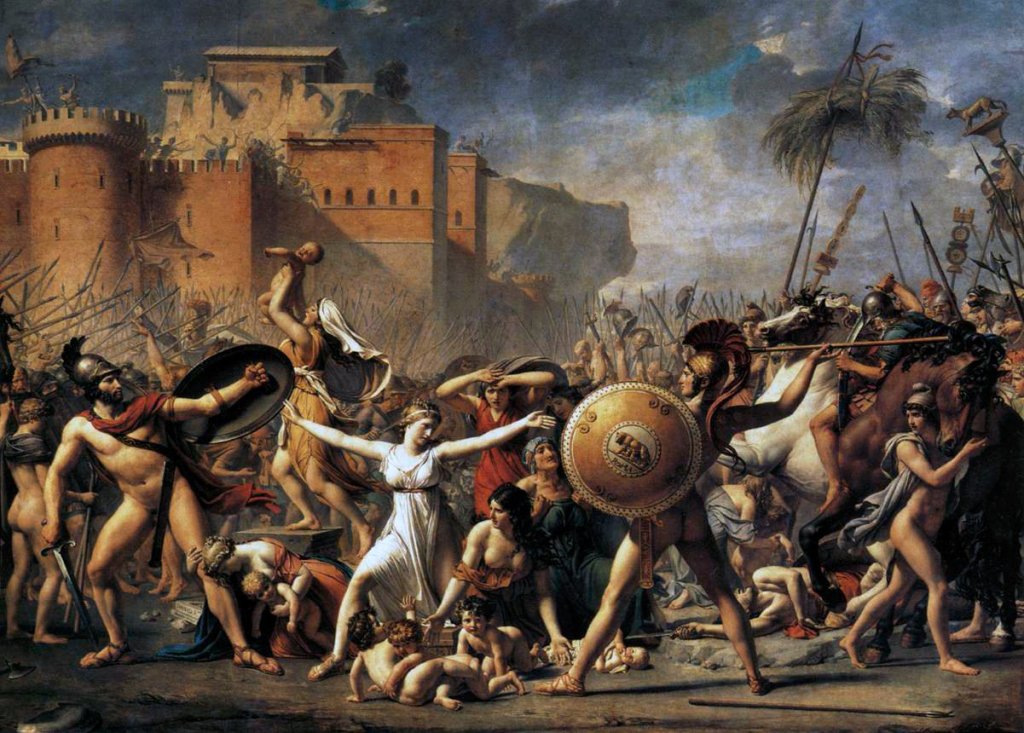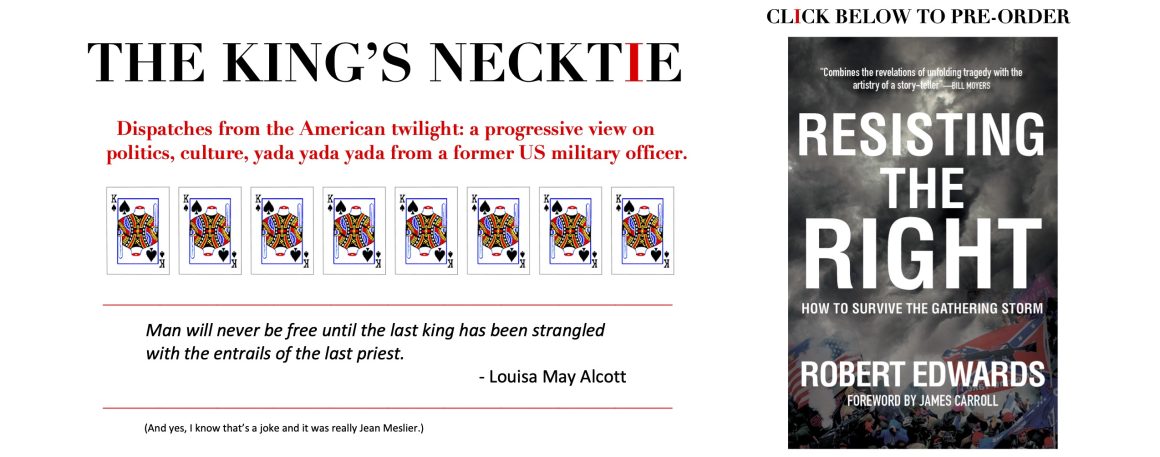
Consequence Forum is an online literary magazine that, in its own words, “addresses the consequences, realities, and experiences of war and geopolitical violence through literature, art, and community events.” CF provides “the public with works and voices from around the world to promote a clearer and more nuanced understanding of what’s at stake in choosing to wage war or engage in conflict.”
In the words of Hal David, that is certainly what the world needs now.
It was my pleasure to have a piece there a few weeks ago, on the heels of some previous work over the past couple of years. What follows is a slightly expanded version of that new essay. Thank you to Consequence’s Executive Editor Matthew Krajniak and to my dear friend Alexandra Marshall for putting us together.
*********
The Siren Song of Violence
As we speak, two major land wars are raging in the world, involving two of the most powerful militaries on the planet, with vast assistance from even more powerful players abroad. The level of violence and human suffering is on a scale above and beyond even the already bloodsoaked baseline of the late 20th and early 21st centuries—what we typically call the postwar period. The name is proving a tragic misnomer.
The repercussions of each of these two wars, let alone the two taken together, promise to be so tectonic that they will reshape geopolitics for decades to come. Zhou Enlai-like, it is far too early even to begin to contemplate their long term consequences. But this much we can say with confidence: They have lowered the public’s threshold for the use of force as a tool of statecraft, and prompted a disturbing uptick in self-righteous, even fanatical cheerleading for killing people in pursuit of political ends.
For American observers, the war in Ukraine reignited a World War II-style righteous passion for the use military force that had largely lain dormant since the fall of Berlin. Certainly in the ensuing 79 years there had been idealistic fervor aplenty for using violence to advance the cause of democracy—to a fault, some would say, be it the starry-eyed naivete of progressivism or the self-deluding rationalization of neoconservatism—and often as cover for less noble goals. But brazen Russian aggression against Kyiv had even old hippies waxing poetic about the bravery of the Ukrainian army, adorning their windows and blue-and-yellow flags, and ending their Facebook posts with Slava Ukraini!
They were not wrong. Who could begrudge the Ukrainian people the right to self-defense against a ravenous, bullying neighbor, led by a monstrous despot? Only resort to the force of arms could defend the country, even as the craven, pro-autocratic Trumpist GOP continues to do its level best to stand on Zelenskyy’s neck and prevent that from happening.
But even among Ukraine’s American supporters, that sense of gung ho has noticeably dimmed as the war has grinded on, and the romance of blackening Putin’s eye (remember the sinking of the Moskva?) has given way to the monochromatic tedium of warfare of a nearly Great War variety. Even the proliferation of combat porn on Reddit has grown repetitive. That our solidarity with the Ukrainian people proved so flimsy did not reflect well on the self-flattering fervor of its early days.
The rise of other high-profile conflicts have also intervened—one in particular—eclipsing the sense of Ukraine as a once-in-a-lifetime global conflagration.
For sheer complexity and unyielding, often blind fervor by the two sides, the war in Gaza is surely the most Gordian political crisis of any of our lifetimes. (The Cuban missile crisis still retains the crown for most dangerous, but it lasted only thirteen days.) In the US, it has scrambled old allegiances, created odd new political bedfellows, and even thrown a highly unpredictable new element into the presidential campaign. Among its most disturbing aspects, many supporters both of Israel and of the Palestinian cause show a remarkable lack of empathy for the suffering of anyone but their own…..and that is true not only of the extremists, but of people who heretofore have been widely considered moderates.
Imagine a group of people filled with righteous anger over the injustices they have suffered. Their legitimate pain and frustration and fury is so great that they have come to believe that anything they do in retaliation is justified, to include the most terrible acts of barbarity against innocent non-combatants, little children among them. These people are quick to cite sophisticated intellectual doctrines and theories to support such action, some of which have the imprimatur of the most highbrow, moral thinkers. But the blood that is shed is just as red.
Imagine now that both parties feel this way. Imagine the rest of the world looking on and taking sides, often without a thorough and nuanced understanding of this ancient and byzantine situation.
In purely practical terms, it would have been unrealistic to expect that Israel would not respond militarily to the attack of October 7, and unreasonable to expect that it should not. The contours and duration of that response, however, are a different matter. It was not hard to predict that an overreaction by the Netanyahu government would ensue. In fact, that was surely one of Hamas’s chief goals, and it’s impossible dispute that it succeeded on that count.
Historically, young people—college students especially—have been passionate about protesting human rights abuses. For their trouble, they are frequently scorned by older generations as disproportionately idealistic, uninformed, and immature. Some of that criticism is on the mark, some not. But notwithstanding those qualifiers, just as frequently, those young people prove to have been remarkably correct. At the same time, righteous anger has frequently tipped into apologia for atrocities committed by one’s own side (adopted or otherwise). We have heard the repetition of slogans that the chanters don’t begin to understand, and the name Nat Turner evoked, and comparisons to the Vietnam-era student left, along with debates over whether such activism helps or hurts the cause, and the presidential candidates it might inadvertently elect or defeat. For idealistic and aggrieved young people especially, a Fanonist belief that revolutionary violence is justified, even required is romantic, and intoxicating….and wildly dangerous.
But maybe even Fanon is too tame. Perhaps we are in Robespierre territory.
On the other side of the divide, enthusiasm for an all-but-unrestrained response by the Netanyahu government has gripped a large section of America, cutting across traditional ideological lines. Once reliably liberal American Jews have been heard to comment on how Fox News actually makes a lot of sense. Irrationally, they have allied themselves with the far right wing of American politics—which is to say, the mainstream of the Republican Party—whose affection for Israel is transactional at best, given its simultaneous embrace of neo-Nazis. Jewish Americans who have been critical of Israel haven been vilified by some in their own community, as a vast paradigm shift is underway in both progressivism and American Jewry at large.
Across the board and irrespective of stance on Gaza, many of us have all found old friendships strained and once civil discourse turned into angry recriminations. We have been surprised by the intransigent, doctrinaire views of people we thought we knew, or with whom we presumed to have a shared worldview and set of values. Even Jerry Seinfeld, as apolitical and proudly anti-substantial an entertainer as any in the modern era, has suddenly had an ideological awakening—or alternatively, chosen to voice his political opinions for the first time—and taken significant heat for it. Even the mildest and most anodyne observation can barely be offered these days without giving offense to someone, let alone a stronger opinion—which has not stopped very many people from offering them, with varying commands of the facts.
But what is most disturbing is the casual advocacy for the use of violence, and half-baked ethical justification for it.
Without wading into a doctoral thesis-length discussion of moral philosophy, generally speaking, most people would instinctively agree that there are acts that are beyond the pale, even in a just war. That is why we have the very term “war crime.” But we need not drag morality into it. Whether one supports it or condemns it, Benjamin Netanyahu’s military campaign in Gaza is exposing the persistent delusion that force can solve all problems, and exposing the limits of violence as a tool of national policy. That is a simple matter of pragmatic reality separate from any moral considerations of who is right and wrong. (As if the thorniest geopolitical problem of the postwar era could be broken down into such Manichean terms.) Yet some of Netanyahu’s fiercest critics simultaneously hew to a celebration of force and violence on behalf of the other side that is just as terrible.
Ukraine provided an almost unicorn-rare example of a conflict the cleaved neatly into good and evil, as the naked aggression of one side contrasted so starkly with the valor of the other. Apart from a small—but politically powerful—pro-autocratic faction of Americans that lionizes Putin, overlapping with a miniscule group of no-exceptions isolationists, and a handful of reflexively contrarian elements, it was easy to swell with vicarious passion for the outgunned, beleaguered Ukrainian underdogs. (Unless you’re a Republican.) Almost too easy. As if made to order, the war in Gaza offered a diametrically opposed counterexample, as complicated and morally gray as possible. Yet even that assertion of grayness will rankle some, both pro-Israel and pro-Palestinian, who point to the ghastliness of their antagonist’s actions, eliding those of their own, which only proves the complexity. Even my comment that hackles will be raised is itself likely to raise hackles. The rabbit hole is very deep.
Even calling what’s going on in Gaza a “war” is controversial. It is certainly an armed conflict between two military forces, albeit a highly asymmetrical one. Some will say that October 7 can only be characterized as an act of terrorism, undeserving of designation as a military operation, which lends it undue legitimacy. Likewise, the operational imbalance of the response, and its attendant, near-apocalyptic destruction, felt most painfully by the civilian populace, has led some to argue that a word like “massacre” is more descriptive of ongoing events than “war.”
Both arguments have some semantic merit, but both ignore the quasi-Clausewitzean understanding of war as the infliction of pain to force submission to a desired political end. Everything else is just arguing with the refs. But both Ukraine and Gaza ought to remind us that that technique does not always work, and that a self-congratulatory ruthlessness, even born of a legitimate grievance, cannot justify slaughter without quarter, by anyone, state actor or non.
Even under the best of circumstances, mankind is remarkably quick to reach for the weapons of war…..and we are currently not operating in the best of circumstances. The siren song of violence is at high volume at the moment, loudest of all in places far from harm’s way, where the human toll of the violence is very abstract and distant, where tribal allegiances—as real and as deeply felt as they are—nevertheless feel like those of passionate supporters at a spectator sport. When we calculate the casualties of the Gaza crisis, first and foremost are the very real ones, in flesh and blood. But another more abstract casualty has been the loss of perspective—and humanity—among those observing from the safety and comfort of home.
*********
Illustration: The Intervention of the Sabine Women, Jacques-Louis David, 1799
